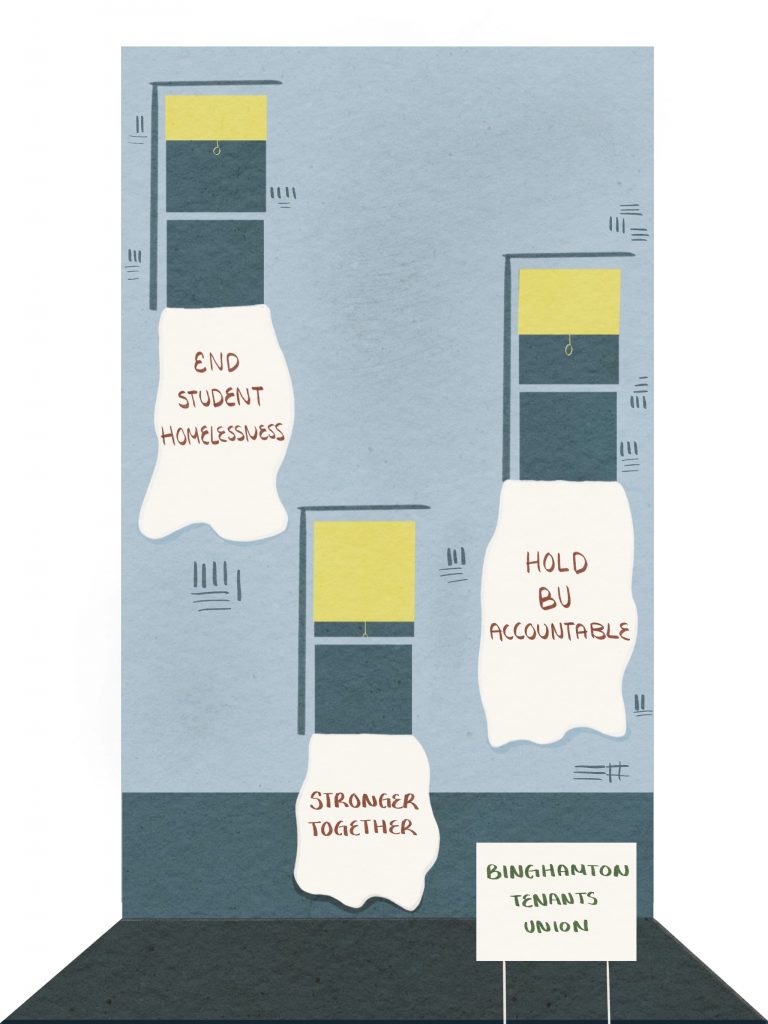Heading into its second year, the UniverCity Tenants Union (UCTU) continues its work in pursuit of more just housing practices for both students and community members.
The union was formed in spring 2022 with the assistance of the Stakeholders of Broome County — a community housing justice organization — in response to the growing housing crisis in Broome County. Major issues contributing to the local crisis cited by the UCTU include the exploitation of students and community members by landlords, rising rates of homelessness and housing insecurity, a depleted number of affordable housing options and a lack of a unified effort between students and the community for housing justice.
In a collective statement, the UCTU described the origins behind their founding.
“This was motivated by the understanding that the housing crisis in Broome County has become catastrophic, and it is primarily a result of student gentrification and [Binghamton] University development,” the organization wrote in an email. “The idea for a union was inspired by the Binghamton Tenants Union, which is a group that serves members of the long-term residents [of the] Binghamton community. We modeled the UniverCity Tenants Union off of this model and legacy of struggle.”
In September, the UCTU collaborated with the stakeholders and the BU’s chapter of the New York Public Interest Research Group (NYPIRG) to host a housing summit in the University Union. The event allowed the organization to educate the campus community on the local housing crisis, the University’s role and how students become involved with efforts to address the crisis. The UCTU noted that the information presented to students in attendance “lead to a huge increase in participation” in pursuit of housing justice.
“[UCTU] works to break down the divide between student and resident and recognize that the struggle for ethical housing requires us to fight on all fronts,” they wrote. “The privilege that students have can be utilized in unique ways, and by connecting activists from different perspectives and backgrounds, we are able to more effectively build tenant power.”
Another union initiative is an anonymous housing survey that collects information on student and their experiences with housing. Its primary goal is to keep an ongoing record of off-campus living experiences to prepare future tenants for obstacles they may run into. The organization also mentioned a tentative “Know Your Rights” training event for the spring semester, where students can learn how to protect themselves from the pitfalls of the local renting and housing system.
Jesse Sippel, a senior double-majoring in political science and economics, said that he sees the value of local and student organizations’ efforts to curb the expansion of the housing crisis.
“I think the call for volunteer work to support the housing crisis in Binghamton is an awesome endeavor,” Sippel wrote. “Addressing the issue as a community and bringing people together is a major step. Binghamton should be very deliberate in the steps it takes to provide more housing and improve the income of all its residents.”
In addition to their current efforts, the union is tentatively planning a website providing survey results and resources. They encouraged students to bring about change and demand more from the University.
“We want students to feel empowered to burst the University bubble and develop true, reciprocal connections with the community we all live in,” the UCTU wrote. “Through UCTU, students have the opportunity to get involved in demanding more from the University — specifically, we want the University to commit to financially contributing to creating affordable housing within the community and to limit its enrollment numbers to ensure a sustainable environment for both the University and the Binghamton community, among other demands we intend to announce in the near future.”



